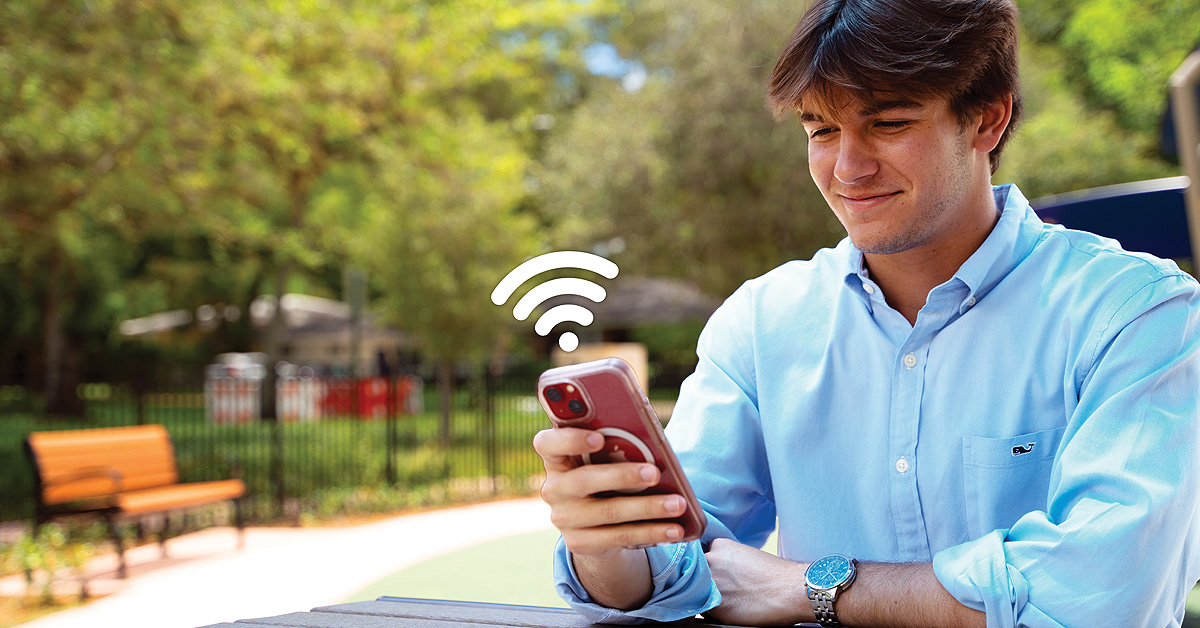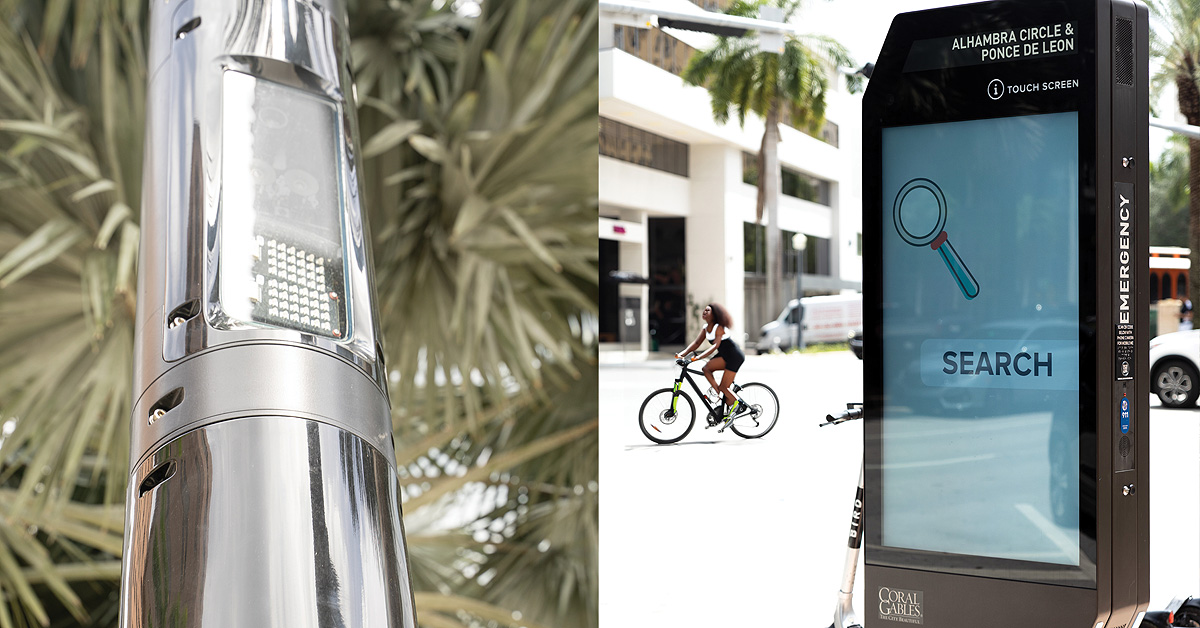
By Michelle Lopez
Harnessing the power of connectivity, municipal leaders are increasingly working to transform their communities into smart cities by enhancing their technological infrastructure to improve efficiency, optimize operations and provide their residents a better quality of life.
Driven by high-volume data providing real-time access to information that can be used to drive business decisions, smart city technology has increased opportunities for digital service providers to create and implement new technologies and opened doors for business and government partnerships.
"Business should engage with city governments, urban planners and relevant stakeholders to understand their priorities and requirements," said Xueping Liang, assistant professor of information systems and business analytics at FIU Business. "Collaborating with city officials can provide valuable insights into the city's development plans, policies and opportunities for partnership."
The growth in opportunities for businesses, experts agree, is driven by smart city technologies and their adoption by consumers. Once those technologies are in use, they collect vast amounts of data that can help identify new business opportunities, promote innovation and increase profit margins.
A report from Frost & Sullivan shows that business opportunities created by the development of smart cities could be worth as much as $2.46 trillion by 2025.
"Businesses that can start innovating now and create technologies and other innovative solutions for this space will be able to create new products or license the inventions for revenue," said Arijit Sengupta, professor of information systems and business analytics at FIU Business.

To collect the must-have data, a smart city uses a series of touch points, primarily automated Internet of Things (IoT) devices that can be attached to buildings, parking spots, traffic cameras or even garbage dumpsters. This new and upcoming technology potentially has far-reaching possibilities in transportation, healthcare, energy consumption, and waste and water management.
"Once functional, these systems will provide opportunities for businesses around them," said Sengupta. He noted that electronic vehicle initiatives will require specialized parking infrastructure, and restaurants or hospitality businesses can provide advertisements or electronic billboards around the parking infrastructure.
Data analytics and artificial intelligence can be used to process this information to help optimize city operations, improve public services and make data-driven decisions. Also, smart security and safety solutions such as video analytics, facial recognition and emergency response systems can be used to enhance urban safety and reduce crime rates.
"Smart cities are dependent on the high-volume data collected every single day," said Liang. "The secret is to make use of the data efficiently and effectively."
In South Florida, several cities have adopted smart city technology, integrating it with business systems, to help keep Greater Miami moving.
The City of Miami recently signed a three-year contract with Rubicon, developer of smart waste and recycling solutions for businesses and local smart city governments. Miami will use Rubicon's technology to streamline waste and recycling collection, track material and tonnage on its bulk-trash routes, and reduce missed pickups.
"By leveraging this technology and the data analytics that we'll recover, we can optimize our collection routes and improve efficiency," said Miami Mayor Francis X. Suarez (BBA '01). "Its platform provides real-time insights into our operation, enabling us to identify areas of improvement and places where we can streamline."
Using the Rubicon platform will allow waste management to identify patterns and improve routes, leading to reduced collection times, fewer disruptions to service and a reduction in fuel consumption.
The City of Coral Gables, Florida has also made strides with its Digital Twin City, developed to help increase transparency and communication between departments at City Hall.
A virtual replica of the city lives on a cloud server that collects data and displays real-time information on various assets, including traffic and available parking spaces, which can be accessed online, explained Rayza Collazo (BBA '14), who helped lead the project in 2022 as an IT systems analyst for the city.
 Smart pole sensors
deliver real-time traffic
and pedestrian data
to the Community
Intelligence Center in
Coral Gables, Florida and smart kiosks provide access to city services, current traffic conditions and transit information.
Smart pole sensors
deliver real-time traffic
and pedestrian data
to the Community
Intelligence Center in
Coral Gables, Florida and smart kiosks provide access to city services, current traffic conditions and transit information.
Giving Coral Gables residents and local businesses access to real-time data was beneficial to show business leaders how a large-scale public art installation, the Umbrella Sky Project, which lined Giralda Plaza with 1,000 colorful umbrellas, brought more foot traffic to the area. Many were concerned about how the initiative would affect their business.
"We used the pedestrian counters to say ‘Hey, look at this data. Because of this art installation, you've gotten all this traffic of people walking through the alley where your business is,'" said Collazo. "It inspired businesses to want to be in that area."
The success of the pedestrian counter on Giralda Plaza led the city to install similar sensors near other businesses. Many retailers in those areas now use the data to plan retail sales or events.
Liang explained that better education about smart city technology can encourage citizen and local business participation, as well as buy-in from stakeholders including the technology sector.
"I believe more educational programs are necessary to help residents understand and enjoy the benefits from recent technologies," said Liang. "People should be provided opportunities to engage in the development of such advancements, such as a trial or seminar, to better understand and feel the real thing."
 Pedestrian counters measured foot traffic entering and exiting a promenade during an art exhibition in Coral Gables, Florida.
Pedestrian counters measured foot traffic entering and exiting a promenade during an art exhibition in Coral Gables, Florida.
Whether on smart devices, or simply logging into Wi-Fi, tech-savvy consumers spent 44% more time on their connected devices in 2022 than they did the year before, according to research from risk management company Assurant.
"Technology companies can partner with governments to implement infrastructure and technical solutions to enable smart cities," said Manny Becerra (BBA '90), chief innovation officer at Assurant. "They can also think about how smart city technology may give them new insight from data and new consumer access points to offer and promote relevant products and services."
Becerra noted that businesses can look at solutions already in place in smart cities and explore changes in the way individuals interact, in order "to spark innovations that will continue to enhance individual experience made available through an increasingly connected world."
Using smart city technology, business owners and executives can compare their market position and performance to that of industry leaders. Technology is also playing an increasingly important role in driving cities' competitiveness to attract new residents and businesses.
Photos courtesy of City of Coral Gables